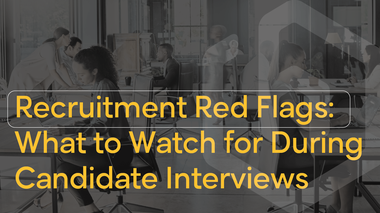Types of Warning Signs
Below, we'll explore several categories of warning signs, including:
- Overall Attitude
- Body Language
- Career Competency
- Additional Considerations
There are many different layers within each of these concepts that, when assessed together, could point you toward passing on the candidate. We'll also discuss how some things considered red flags in the past might not be absolute deal breakers.
Overall Attitude
Part of the evaluation of candidates is how they communicate. You'll assess their overall attitude about their work, the job they're applying for, previous experience, and how they might get along with your current team. Here are some of the most common red flags for attitude.
Negativity:
- May impact team morale and productivity.
- Suggests difficulty in adapting to challenges or changes.
- Could indicate poor interpersonal skills and communication.
Often this comes across when asking questions about previous employment. They may not know how to self-edit, and they'll badmouth a previous manager or coworker. You may choose not to hire them because you're concerned about them bringing this attitude to your workplace.
Desperation:
- Raises questions about the candidate's self-confidence and value.
- Might imply a lack of thorough job search or preparation.
- Could lead to potential issues with decision-making and long-term commitment.
We know that the economy is challenging right now. We have to strike a balance to show empathy to struggling people. But when an applicant exudes desperation by essentially making their problems the fault of employers or the system, it can lead to concerns about how they will perform.
Arrogance:
- May hinder collaboration and teamwork.
- Suggests an unwillingness to learn from others or take feedback.
- Could lead to conflicts within the workplace and alienation of colleagues.
It's essential to recognise the difference between confidence and arrogance, and it's often a fine line. But when someone raises this red flag, it could mean they won't work out as a team player in your environment.
Rudeness:
- Reflects poorly on the candidate's professionalism and social skills.
- Raises concerns about the candidate's ability to interact with clients, customers, and coworkers.
- Indicates a lack of respect for others and the company's values.
A candidate's rudeness often shows up in the early moments of the interview. For example, if they treat the person who greets them rudely, the assessment should be that they lack basic respect.
Complaining:
- May indicate a negative attitude and lack of resilience.
- Raises doubts about the candidate's ability to handle stress and challenges.
- Suggests potential issues with adapting to the company's culture and environment.
Complaining takes a negative attitude and desperation to the next level. When the only talking points a person can make are about how everything else is wrong, they may not be able to handle your work environment.
Body Language
Humans don't only communicate through speaking. We also share a lot of information through our body language. Here are a few things you might want to look out for during an interview that could be red flags. However, remember that there are many variables to body language, and some can indicate neurodivergence and not a lack of respect or inability to perform the job, so always consider all factors.
Handshake:
- Weak or limp handshake might indicate a lack of confidence or assertiveness.
- Overly aggressive handshake could suggest poor social awareness or overbearing behaviour.
- A firm and professional handshake is typically expected, and deviations might raise concerns about interpersonal skills.
While a handshake is still considered an essential part of introductions, there are many reasons that people will choose not to shake hands with a relative stranger. Be aware that the spread of germs or wrist pain are valid reasons for requesting not to shake hands.
Eye Contact:
- Avoiding eye contact might convey nervousness, lack of confidence, or potential dishonesty.
- Constantly staring might make others uncomfortable and suggest aggressive or confrontational behaviour.
- Appropriate and consistent eye contact is vital to show engagement and honesty.
However, like a handshake, avoiding eye contact isn't always communicating dishonesty or nervousness. Many people feel uncomfortable making sustained eye contact, but that doesn't mean they are incapable of their work. Keep this in mind and use other context clues to help you determine if this is a negative pattern or natural behaviour.
Inappropriate Dress:
- Overdressing might imply poor judgment of the company culture or expectations.
- Underdressing might be seen as disrespectful or a lack of understanding of professional standards.
- Appropriately dressing according to the company's dress code or industry norms reflects preparedness and respect for the interview process.
You should always provide guidance on the dress code for interviewing. Candidates will often default to professional dress, including suits. If you want to convey that your environment is less formal, tell them that business casual or casual wear is okay within specific professional guidelines.
Career Competency
Of course, the interview process is your time to determine if the candidate's skills match the requirements for the position. When assessing their competency, here are some things to consider.
Overuse of Buzzwords:
- May suggest a lack of depth in understanding or practical experience.
- Raises concerns about genuine expertise and the ability to deliver results.
- Could indicate an attempt to compensate for inadequate knowledge.
Buzzwords and overly technical jargon can be concerning for some employers. Often explaining the work using simple terms is essential to better communicate with people outside that skill set.
Job Hopping:
- Suggests a lack of commitment or inability to stick to a job.
- Raises doubts about the candidate's ability to contribute meaningfully to the company.
- Might indicate problems with adaptability or interpersonal skills.
Before you put too much stock in this information, consider the many valid reasons someone may have a gap in their resume. Especially over the last three years, significant challenges in the job market have made these gaps less of a concern for employers. It's okay to ask about their time away from work to determine if the reason is genuinely disqualifying.
Lack of Basic Details:
- Indicates poor attention to detail or lack of preparation.
- Suggests a lack of genuine interest in the company or role.
- Could imply potential issues with thoroughness and accuracy in job tasks.
Attention to detail is probably one of the most important skills any employee can bring to the table in any role. A lack of basic knowledge, the inability to answer questions about things they should know in this role, and dropping loose ends could be problematic for employers.
Inconsistent Information on CV:
- Raises concerns about honesty and integrity.
- Undermines trust and credibility in the candidate's qualifications.
- Could indicate potential issues with communication skills or organisational abilities.
It is a significant red flag when the candidate's CV doesn't match other information, such as background checks or references. Honesty on their paperwork is paramount to determining if they are a good fit for the role.
Lack of Career Progression:
- Raises doubts about the candidate's motivation and ambition.
- Suggests a lack of initiative or inability to take on new challenges.
- Might indicate a stagnant skill set or resistance to growth and development.
Like with gaps on the CV, a lack of progression may not indicate poor performance, but it's important to get to the bottom of why. Feel free to ask why they haven't moved up in roles where that is the expectation.
Additional Considerations
Several other red flags might not fit the previous categories that might concern employers. Consider the following when making your assessment as well.
Checking or Answering Their Phone:
- Shows a lack of focus and respect for the interview process.
- Indicates poor time management and inability to prioritise.
- Raises concerns about potential distraction and lack of professionalism.
Unless someone discloses that they are waiting for a possible emergency phone call during your meeting, they should have their phone on silent and not check it at any point. As the interviewer, you must also respect their time by doing the same.
Arriving Late to the Interview:
- Suggests poor punctuality and time management skills.
- Raises doubts about the candidate's commitment and interest.
- Could indicate a lack of respect for others' time and the company's expectations.
Arriving late is a big red flag for most people. It could set the pattern for their performance once hired. There should be some grace if the candidate calls ahead of their arrival with a plausible reason. Still, it's worth noting that and watching for tardiness and absences in their probationary period.
Inability to Provide Professional References:
- Raises questions about the candidate's work history and qualifications.
- Implies potential issues with past performance or relationships with colleagues.
- Could indicate a lack of professional connections or an inability to secure positive references.
The inability to provide references can be a red flag unless they apply for a genuinely entry-level position. Everyone should prepare before their interview by contacting their references for permission to provide a list with contact information.
Discussing Inappropriate Topics:
- Demonstrates poor judgment and lack of awareness of professional boundaries.
- Raises concerns about the candidate's ability to represent the company well.
- Could indicate potential issues with communication and sensitivity.
The advice is always not to discuss issues like religion or politics, but that doesn't mean everyone follows it. If the candidate can't resist providing insights on topics unrelated to the workplace, they may not be a good fit for your culture or environment.
Sharing Too Much Personal Information:
- Suggests a lack of professionalism and self-awareness.
- Raises concerns about the candidate's ability to maintain appropriate work-personal boundaries.
- Might indicate potential oversharing or difficulty in maintaining focus on job-related matters.
It's always a good idea to balance empathy and keeping things professional. It's okay for a candidate to mention a thing or two unrelated to the job, but if the information becomes too personal or irrelevant, that might be a red flag.
Can You Track Interview Results and Candidate Comparisons?
Interviewing for open positions can be overwhelming when you don't have integrated systems to organise your time. Tracking candidate interviews and the results can help you make a better hiring decision at the end of the process.
You don't have to go it alone. Investing in the right software gives you the structure and framework to manage talent and what you have to offer. Using a system to help you track and hire top talent is the first step in the process.
With more competition for top talent, it pays for companies to consider all their advantages and the use of tools to assist in the quest to find talent. HireHive helps busy people hire great people. You can post jobs, streamline your online application process, improve the candidate experience, and tap into vast global networks by having your entire recruitment process in one place.
Set up a free trial account today. Contact HireHive to learn more.







